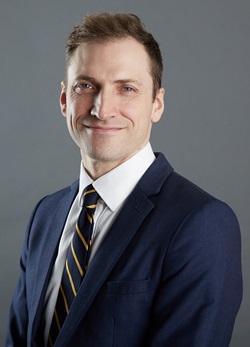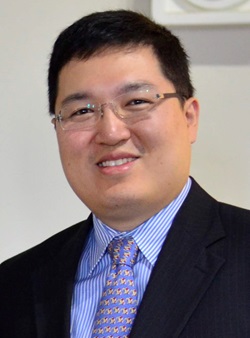2025 | Volume 26 | Issue 4
Established in 2006, the RACS Trainees’ Association (RACSTA) Committee comprises of representatives from all surgical specialties including Aotearoa New Zealand and state and territory committees. It provides input at all levels through to the RACS Council.
RACSTA represents the interests of Trainees within RACS by advocating for issues affecting them. These include quality of training, workplace culture and wellbeing. The aim is to enhance surgical education and training while ensuring the Trainee experience is enjoyable, productive, and well-supported.
RACSTA collaborates with RACS Boards, Committees and specialty groups and are regularly invited to comment on matters that affect Trainees.
Over the next few issues of Surgical News, we will be introducing you to RACSTA Committee members.

Name / SET Level/RACSTA role
Nick Lyons , SET 5
Tell us about yourself
I’m the Chair of RACSTA, having previously served as Deputy Chair, Executive member for the training portfolio, and Victorian Trainee Regional Representative.
I’m currently training in General Surgery at the Austin Hospital in Melbourne, where I’ve enjoyed a breast surgery term focused on reconstructive work. My long-standing goal to pursue a CSSANZ Fellowship has come to fruition and I have been accepted in to this program. I have been drawn to the broad scope of colorectal surgery and its management of both benign and malignant disease. I began surgical training as a Principal House Officer (PHO) in Queensland and entered the SET program in 2019 after deferring for a year to start a PhD.
How would you describe your surgical training journey?
Non-linear is probably the best description. I studied medicine at the University of Birmingham and completed foundation and core surgical training in the UK. I initially planned to become a GP in rural West England, where I grew up, but changed direction during medical school after discovering a strong interest in surgery.
I first considered neurosurgery, then orthopaedics, followed by plastic surgery, before finding my place in colorectal. I moved to Australia in 2016, prompted by the junior doctors’ strikes and the decline in surgical training opportunities in the NHS.
I worked as a PHO in Queensland while awaiting permanent residency and concurrently began a PhD in colorectal cancer. My research was disrupted by the COVID-19 pandemic, requiring flexible training and a six-month interruption to complete my thesis. My clinical training has been largely Melbourne-based, with a rural term in northern Tasmania. I recently passed the Fellowship exam and am now exploring post-Fellowship opportunities.
Why did you join the RACSTA Committee, and is there an area of advocacy you're most driven by?
Having experienced the challenges of surgical training in both the UK and Australia, I’ve always been committed to high-quality, safe training and strong Trainee representation. I joined RACSTA in 2021 as the elected Victorian regional Trainee representative and have remained involved since.
My key advocacy focus is improving the portability of leave entitlements and addressing relocation costs—issues that disproportionately affect Trainees with caregiving responsibilities—particularly women. These are systemic challenges, and achieving progress in this area remains a priority for me.
What are your hopes for the future of surgical training in your specialty, or training more broadly?
I hope to see national consistency in the transfer of entitlements such as parental, sick, and long service leave across jurisdictions. Removing these barriers would significantly improve equity within surgical training.
What advice would you give to junior doctors interested in your specialty?
General Surgery offers a broad, dynamic, and rewarding career, with excellent flexibility and geographic mobility across Australia and Aotearoa New Zealand. Don’t be discouraged by the competitiveness of SET applications or the demands of busy rotations. Embrace the challenges and take the opportunity to advocate for yourself and your colleagues.
Fun fact: I’m a big fan of Brooklyn 99.

Name / SET Level
Jim Yip, GSET1
Tell us about yourself.
I’m the New South Wales regional Trainee representative on the RACSTA Committee, a role I began in May 2025.
I’m currently based in the NSW Central Network, training at my alma mater, Royal Prince Alfred Hospital in Sydney. I’ve just started my General Surgery training this year, drawn to the specialty since medical school—especially the satisfaction of laparoscopic abdominal procedures, which first captivated me during an appendectomy assist.
How would you describe your surgical training journey
My journey to this point has been relatively long and convoluted—selection, CV points, etc.—were challenging and I accrued a decent amount of experience as an unaccredited registrar in multiple hospitals. These were mainly in General Surgery but also in other subspecialties (have never done orthopaedics). I have loved every moment of my time in unaccredited jobs and that's why I'm still here despite the long road. My family including my wife and three kids have also been a vital source of support and inspiration.
What made you want to join the RACSTA Committee and is there an area of advocacy you're most driven by?
I wanted to be a voice for Trainees, particularly those doing it tough. My goal is to advocate for more practical support whether that’s through financial relief, better relocation assistance, or simply making sure our concerns are heard at the highest levels.
As someone who has worked extensively across many hospitals—both metropolitan and regional—I wanted to help with the challenges Trainees face, particularly regarding logistics, financial hardship and the growing costs of training/living.
What are your hopes for the future of surgical training in your specialty, or training wide?
I want surgical training to continue improving in its ability to prepare us for future practice as consultant surgeons, upholding the same standards—if not higher. This should be done while simultaneously being compassionate and mindful to the needs of Trainees. This is a difficult balancing act and there are many issues with training today that need urgent attention. But I hope in future we can look back and be proud of how we improved our profession for future generations.
What advice would you give to junior doctors interested in your specialty?
Make sure that it's really what you want to do. Get that GSSE, CV, courses, research, and other requirements done as quickly as possible. Try to enjoy what you do and be good and kind to one another. This is a long marathon best run with your supports by your side and a positive mindset.
"Motivation determines what you do, Attitude determines how well you do it." - Lou Holtz
Fun fact: I really enjoy mechanical timepieces (watches).